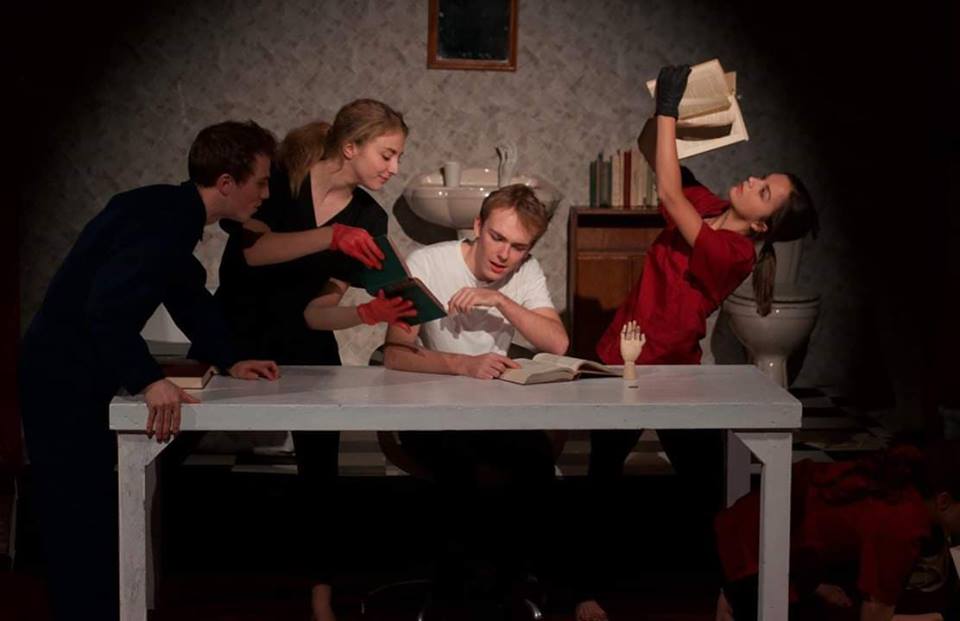Theatre Group’s production of Doctor Faustus was directed by Olivia Allen and adapted into the modern era from Christopher Marlowe’s 1592 classic. It follows Faustus, an academic who turns to black magic in a thirst for limitless knowledge. Selling his soul to Lucifer in return for these powers, a tale of greed and cunning ensues. This adaptation successfully intertwines bold dialogue with a range of physical theatre, producing an impressive and ambitious performance.
Upon entry into the theatre, I was immediately thrown into the dark and ghoulish world of Faustus, with the cast set around the stage in an unnerving shape and fashion, staring out at the audience dressed with unnerving smiles. The set enclosed was simple yet effective, comprised of a bathroom and a moveable table, which was used effectively and moved around from scene-to-scene. This combined with the dreary red and white lighting effectively displayed changes in scene and location. As the show commenced, the audience were greeted with a bold display of physical choreography, to which the play owed its greatest strengths to. The seamless movement held together by the chorus as a whole kept you in the action, and did not fail to amaze as each blocking moved fluidly to the next, accompanied by the opening lines of the play. This did a great job in setting the tone of the play, and immediately engaging the audience in the material. Lots of credit must be owed to choreographer Kashka Arnell, who evidently spent a large portion of preparation perfecting these movements. Throughout the play, this physical work continued to impress and visually build upon the scene in times when the Elizabethan language may have been difficult to follow.
The level of acting was strong across the board, which was advantageously melodramatic and driven by strong emotive facial expressions. Thomas Davy, portraying Faustus, was set the ambitious task of never leaving the stage, and he really held his own here, successfully portraying the impulsive and insatiable nature of the character, only allowing for a few moments of doubt in his portrayal. Most notably, Lydia Duval’s performance as Mephistophilis shone through, with her devious and sly approach to the devilish character leaving me wanting to see more; a top-tier presentation! The cast were strongest however when working as a whole, and the chemistry between the chorus was delightful. The group were built strongly together, and nobody seemed to fall behind any others in quality or significance.
The few setbacks of the show are more technical and pedantic rather than down to the performances. There were a few moments of prop misplacement which, though were cleared up or fixed by the actors, was distracting and took me out of the show a little bit. This was not always helped when props were left on the moving table, which would result a few times in them falling onto the floor in a disruptive manner. As well as this, there were several occasions where the actors were left turned away from the audience during moments of dialogue. This made their lines unclear and thus ineffective, breaking a classic rule of theatre: don’t turn your back to the audience! A few other moments also left those who were speaking out of the lit areas of the stage, which again was confusing in understanding who was talking. This could have been down to the directing, lighting, or the actors themselves. A few line slip-ups here and there were also noticeable but dealt with quickly and professionally.
In conclusion, although there were a few technical errors and slips in spots, this did not detract ultimately from the strong performances, emotive tone and incredibly impressive physical theatre that Theatre Group’s Doctor Faustus had to offer. A well-condensed adaptation of the play left me excited to see more from both the productive team and the cast members in the future.
Rory Yeates
Image Courtesy of Abby Barker

